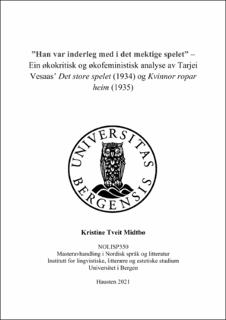"Han var inderleg med i det mektige spelet". Ein økokritisk og økofeministisk analyse av Tarjei Vesaas' Det store spelet (1934) og Kvinnor ropar heim (1935).
Master thesis
Permanent lenke
https://hdl.handle.net/11250/2834058Utgivelsesdato
2021-11-23Metadata
Vis full innførselSamlinger
- Master theses [274]
Sammendrag
Denne avhandlinga er ein analyse av Tarjei Vesaas sine to Bufast-romanar, Det store spelet (1934) og Kvinnor ropar heim (1935) med bakgrunn i økokritisk og økofeministisk litteraturteori. Eksisterande forsking på Tarjei Vesaas sine Bufast-romanar har drøfta liknande perspektiv, som vitalisme, men det er lite eksistarane forsking på desse verka med bakgrunn i økokritikk. I denne avhandlinga ønsker eg å vektlegge den viktige rolla naturen speler i menneskets liv på ein gard. Nokre av hovudpoenga i denne avhandlinga handlar om avhengnadsforholdet mellom menneske og natur, og korleis kontinuiteten på ein gard kan vise oss nettopp dette. Eg undersøker også kva for menneskesyn og syn på kjønn som kjem til syne i dei to romanane. Føremålet med oppgåva er å undersøke korleis eldre verk kan lesast i lys av nyare litteraturteori og kva for perspektiv frå samtida som kan bli løfta fram av teorien. Eg stiller meg i dialog med tidlegare Vesaas-forsking, og samstundes er denne avhandlinga eit bidrag til nyare økokritisk forsking. Med eit bredt teoretisk bakteppe, med økokritikarar som Grag Garrard, Cheryll Glotfelty og Lawrence Buell, samt feministiske og økofeministiske tankar frå Simone de Beuavoir, Sherry B. Ortner, Carol J. Adams og Lori Gruen, viser eg kva for moglegheiter som finst i økokritikken og økofeminismen. Analysedelen fokuserer på desse moglegheitene i romanane, og eg les romanane komparativt gjennom heile analysen. Innleiingsvis i analysen gjev eg eit detaljart handlingsreferat av Det store spelet og Kvinnor ropar heim for å skape betre forståing for mine val av scener i analysen. I siste del av oppgåva konkluderer eg og svarar på forskingsspørsmåla eg har skissert i innleiinga av avhandlinga. This thesis is an analysis on Tarjei Vesaas’ two Bufast-novels, Det store spelet (1934) and Kvinnor ropar heim (1935) focusing on ecocriticism and ecofeministic literary theory. Prior research on Tarjei Vesaas’ Bufast-novels has discussed similar perspectives such as vitalism, but there is a lack of research done on the novels focusing on ecocriticism. With this thesis, I wish to focus on the important role nature has in human farm life. Some of the key arguments in this thesis is about the dependency between human and nature, and how the continuity on a farm might portray this. I will also investigate the view of mankind and gender that is portrayed in the novels. The purpose of the thesis is to investigate how older texts can be read in light of newer literary theory and what perspectives from present times can be portrayed by the theory. I will discuss using prior Vesaas-research, as well as contribute to newer ecocritical research. Using a broad variety of theory, with ecocritics such as Grag Garrard, Cheryll Glotfelty and Lawrence Buell, as well as feministic and ecofeministic thoughts from Simone de Beauvoir, Sherry B. Ortner, Carol J. Adams and Lori Gruen, I present the possibilities existing in ecocriticism and ecofeminism. The analysis focuses on the possibilities in the novels, and I read the novels comparatively through the whole analysis. In my introduction of the analysis, I give a detailed summary of Det store spelet and Kvinnor ropar heim to give a better understanding of the scenes in the analysis. At the end of my thesis, I will conclude and answer my research questions outlined in the introduction.
